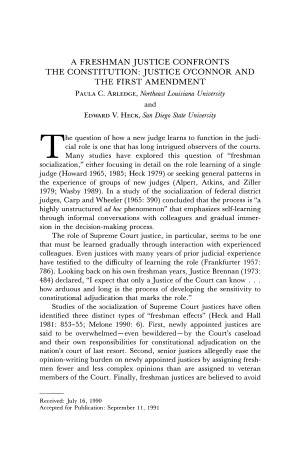A Freshman Justice Confronts the Constitution: Justice O'Connor and the First Amendment
September 11, 1991

DISCLAIMER: This text has been transcribed automatically and may contain substantial inaccuracies due to the limitations of automatic transcription technology. This transcript is intended only to make the content of this document more easily discoverable and searchable. If you would like to quote the exact text of this document in any piece of work or research, please view the original using the link above and gather your quote directly from the source. The Sandra Day O'Connor Institute does not warrant, represent, or guarantee in any way that the text below is accurate.
Article Text
(Excerpt, Automatically generated)
A FRESHMAN JUSTICE CONFRONTS
THE CONSTITUTION: JUSTICE O'CONNOR AND THE FIRST AMENDMENT
PAULA C. ARLEDGE, Northeast Louisiana University
and
EDWARD V. HECK, San Diego State University
The question of how a new judge learns to function in the judi cial role is one that has long intrigued observers of the courts.
Many studies have explored this question of "freshman socialization," either focusing in detail on the role learning of a single judge (Howard 1965, 1985; Heck 1979) or seeking general patterns in the experience of groups of new judges (Alpert, Atkins, and Ziller 1979; Wasby 1989). In a study of the socialization of federal district judges, Carp and \Vheeler (1965: 390) concluded that the process is "a highly unstructured ad hoc phenomenon" that emphasizes self-learning through informal conversations with colleagues and gradual immer sion in the decision-making process.
The role of Supreme Court justice, in particular, seems to be one that must be learned gradually through interaction with experienced colleagues. Even justices with many years of prior judicial experience have testified to the difficulty of learning the role (Frankfurter 1957: 786). Looking back on his own freshman years, Justice Brennan (1973:
484) declared, "I expect that only a Justice of the Court can know . . . how arduous and long is the process of developing the sensitivity to constitutional adjudication that marks the role."
Studies of the socialization of Supreme Court justices have
